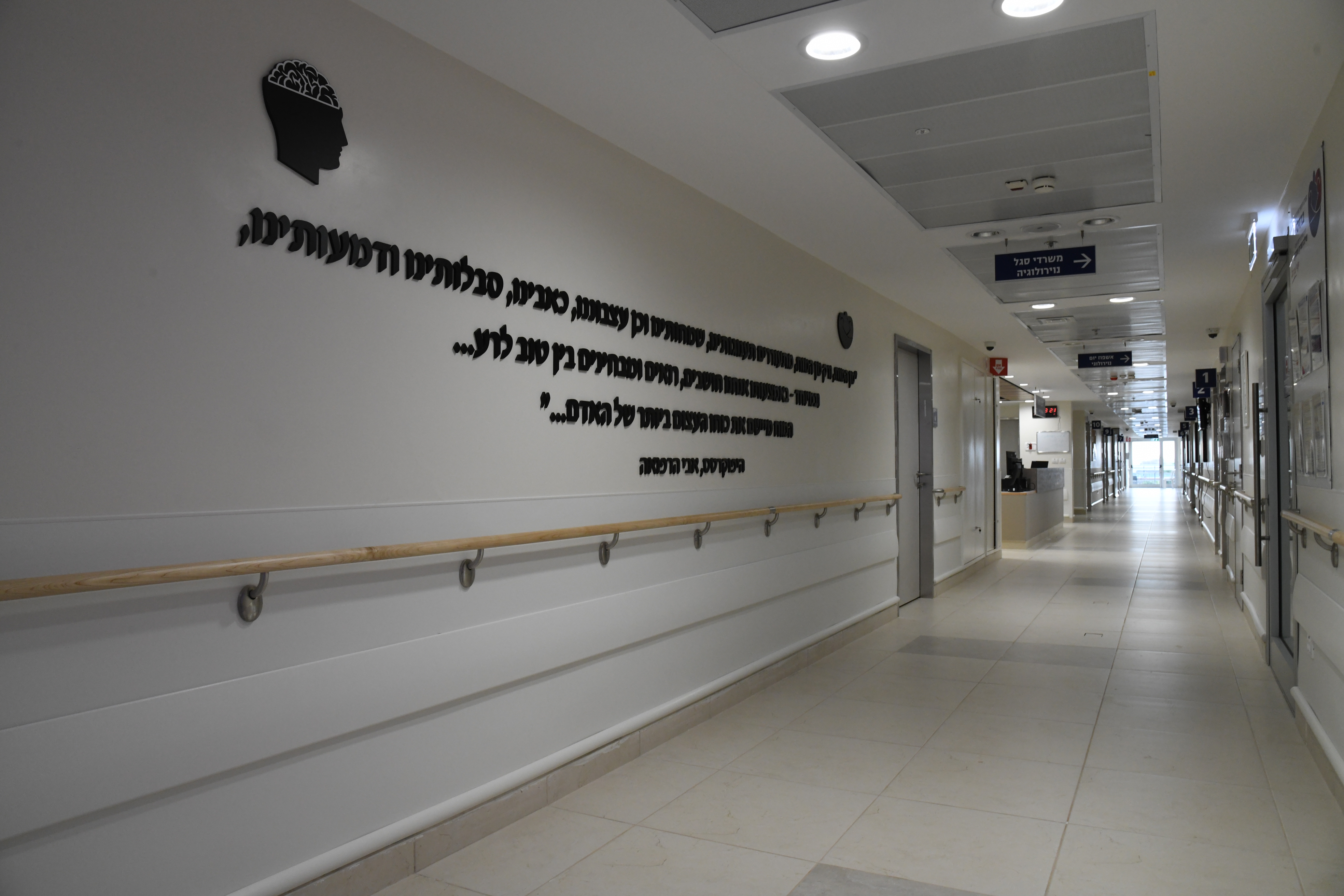|
The Adir and Lydia Ben Yosef Neurology Department

Head of Department
Dr. Shmuel Appel
Head Nurse
Sima Beniel
Deputy Head Nurse
Sigal Zechariah
Telephone number of the nurses’ station
08-6663842, 08-6663843
Location
The department has moved to its new location in Compound 400, opposite Internal Department E.
Secretary
Osnat Azulay
 972-8-6663835 972-8-6663835  972-8--6663850 972-8--6663850
Senior Physicians
-
Dr. Ana Guelfand - Director of the Stroke Service
-
Dr. Shmuel Appel – Director of the Department, Epilepsy Clinic
-
Dr. Natalya Tikhmanovich - Director of the Neuromuscular Service, EMG and Botulinum Injections
-
Dr. Zeev Nitzan - Director of the Movement Disorders Service, Memory Clinic and Multiple Sclerosis Clinic
-
Dr. Michael Osherov - Multiple Sclerosis
-
Dr. Leah Pollack – Dizziness and Balance Disorders
-
Dr. Safadi Daniel
-
Prof. Esther Kahana - Teaching and Research
-
Dr. Ron Milo - Teaching and Research
Main departmental activities:
The Neurological Department at Barzilai includes an inpatient department, a stroke unit, and an ambulatory neurological institute that includes multidisciplinary clinics and services for a variety of neurological disorders, neurophysiological tests and a research unit.
Patients are admitted to the hospital for the purpose of diagnosis and treatment of disorders and diseases of the nervous system. Patients are accepted from the Department of Emergency Medicine, hospital wards, outpatient clinics and community clinics. The department works with consultants from the field of neuro-ophthalmology, psychiatry, vascular surgery, internal, neuroradiology, social services, physiotherapy and the Institute of Occupational Therapy for functional evaluations and the beginning of inpatient rehabilitation. The Department has advanced auxiliary tests in the field of brain imaging (CT, MRI, SPECT), blood vessels (duplex, TCD) and neurophysiology (EEG, NCT+EMG, excitation potentials).
The Neurological Institute's clinics include:
A general neurological clinic : Patients from the community and the IDF and those after hospitalizations are seen for the purposes of follow up, diagnosis, treatment and monitoring of various neurological disorders.
The Clinic for Movement Disorders
Patients are diagnosed and treated for possible movement disorders such as Parkinson's disease, Huntington's disease, tremor of various causes, Tourette's syndrome, instability and gait disorders, and others.
The Epilepsy Clinic
An in-depth investigation is carried out in the clinic for patients with severe, hard to manage epilepsy, following hospitalization and from the community. The purpose of the investigation is to determine a precise diagnosis and the optimal treatment. At times that the traditional drugs do not prevent the epileptic attacks, patients may be referred for advanced interventions, including surgeries and pacemaker transplantation. One way of diagnosis and follow up of the patients is the video-EEG monitoring unit in the inpatient department.
The Memory Clinic
Patients are evaluated, diagnosed and treated for common memory problems, including diseases that cause dementia such as Alzheimer's disease and ADHD.
Multiple sclerosis and Neuro-immunology clinic
The clinic is part of a multidisciplinary center that includes leading specialist neurologists in the field, a nurse, a social worker, a neuro-ophthalmologist, a neuro-radiologist, research technicians and coordinators. This multidisciplinary team will make a comprehensive diagnosis for such disease as multiple sclerosis and other demyelination diseases. The center is skilled in providing state-of-the-art treatments while admitted to hospital, as well and having advanced diagnostic methods at its disposal, including MRI and tests of excitation potentials.
The clinic conducts numerous research studies, including international research on new MS drugs. Participants in the studies receive innovative treatments, close and stringent follow-up and monitoring, including periodic MRI tests, at no cost and without the need for a commitment from the HMO.
Stroke Clinic,
Follow up of patients who were discharged after severe stroke and referrals from the HMOs of patients with vascular disorders of the brain for the purpose of diagnosis and treatment are seen on the clinic. The clinic works closely with the stroke unit, brain catheterization centers, vascular surgery and the radiology institute, and uses doppler examinations via the skull to diagnose vascular problems. Three senior physician work at the clinic who have been trained both in Israel and abroad.
Headache Clinic
The clinic deals with the diagnosis and treatment of common types of headaches such as migraine and stress headaches, as well as rare types of headaches and facial pain. In addition to medicinal treatments, botulinum injections and neural blocks are also provided.
Neuromuscular Clinic
The Neuromuscular clinic deals with diseases of the peripheral nervous system (neuropathic), the muscular system (myopathic), and the connection between nerve and muscle (Myasthenia Gravis). The clinic has state-of-the-art instrumentation for conducting neurophysiological tests to evaluate nerve and muscle function, such as EMG, nerve conductivity and single fiber EMG. The clinic has connections with the Institute for the Conduction of Nerve and Muscle Biopsies.
Botulinum Injection Clinic
Patients are treated by injection of the botulinum toxin (Botox and Dysport) for the indications with health-provision coverage, of contractions and disorders of muscle tone such as blepharospasm, facial dystonia, Torticollis, upper limb spasticity following a stroke, and lower limb spasticity in children with cerebral palsy. In addition, injection treatments are also given to combat migraines.
The tests at the Neurological Institute include:
EEG (electroencephalography, brainwave recording)
EEG during sleep
EMG+NCT: Electromyography and peripheral nerve conduction speed test. The tests are performed in our neurology clinic and it is the only center of its kind in the South that also performs EMG tests on a single fiber in order to diagnose connective diseases between nerve and muscle.
Excitation Potentials from the optic system (VEP), hearing (BERA) and sensory (SEP) to detect disturbances in sensory pathways in the brain and spinal cord.
TCD (Doppler via the skull) to assess blood flow in the cerebral blood vessels.
Research and teaching
The department conducts many clinical studies in all areas of neurology, in addition to clinical and basic studies in collaboration with other academic and scientific institutions. The Neurological Department has been recognized by the Scientific Council of the Medical Association as specializing in neurology and serves as the academic teaching department of the Faculty of Health Sciences at Ben-Gurion University of the Negev, devoting much of its time to teaching medical students from Ben-Gurion University and abroad, teaching interns, nursing students and more. |